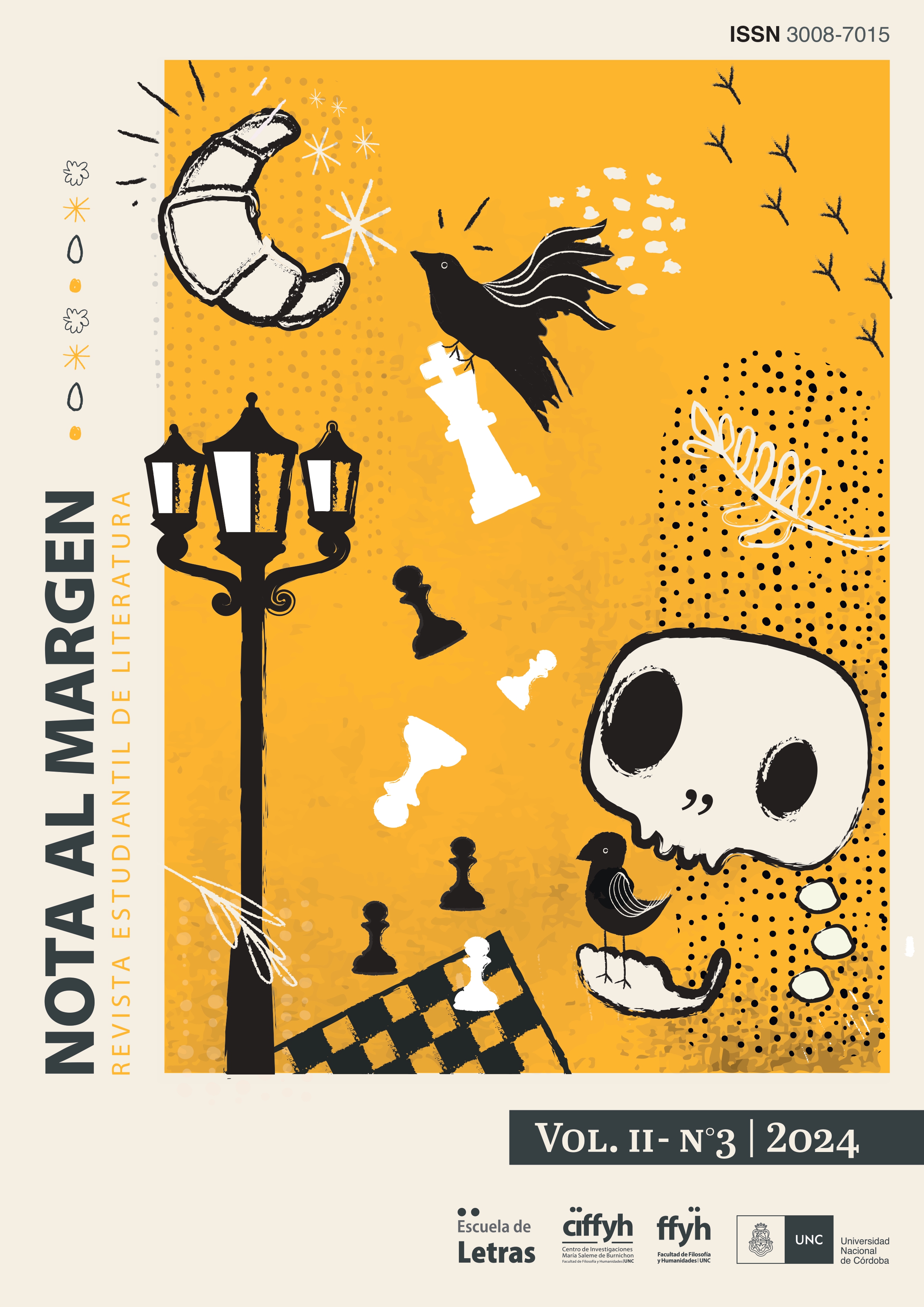Representation of Theseus from the Perspective of Ariadne, According to Catullus and Ovid
Keywords:
Catullus, Ovid, Ariadne, Theseus, Heroides, representationAbstract
The myth of Ariadne and Theseus has been a source of inspiration for different authors throughout time. Our work engages with the reworking carried out by Catullus in his poem Carmen 64 and for Ovid in his production on Heroida X, in order to delve into the perspective of the voice of the heroine, Ariadne, and how the hero figure is built through her gaze as a woman. These authors belong to two different historical and cultural moments in Rome, the Republic and the Empire, respectively. Therefore, we consider it relevant to contrast them, so it's possible for us to analyze how the versions adopted by each one complement or distance themselves from one another.
For our mythical sources we selected the theoretical contributions of Lía Galán (2003) and Pierre Grimal (1989). Also, to complement the comparative analysis of the selected corpus, we rely on Lía Galán's interpretation of Carmen 64 and Claudia Lobo's (2009) analysis of the Heroides, focusing on the heroine's claims to her beloved. In this work we try to provide a new point of view on the mythical-literary past, in order to introduce a hero and a heroine that are far from the epic tradition ideal.
Downloads
References
Alvar Ezquerra, A. (1997). La elegía latina entre la República y el siglo de Augusto. En C. Codoñer (Ed.), Historia de la literatura latina, 191-206. Cátedra.
Carlos González, A. G. (2023). Ariadna: una comparación entre Catulo y Ovidio. En Nexo 19: revista intercultural de arte y humanidades de la sección de estudiantes y jóvenes investigadores y creadores del IEHC, (19), 3-8. https://dialnet.unirioja.es/servlet/articulo?codigo=9000733
Catulo, C. V. (2008). Introducción. Vida y obra de Catulo. En L. Galán (Trad.), Poesía completa, pp. 5-36. Colihue.
Cristóbal, V. (2015). Lavinia de Úrsula K. Le Guin, una novela virgiliana. En Cuadernos de Filología Clásica. Estudios Latinos, 15, (2), 362-376. https://doi.org/10.5209/rev_CFCL.2015.v35.n2.51105
Cristóbal, V. (2012). Biografía de Ovidio. En Ovidio, pp. 13-19. Gredos.
Cristóbal, V. (2012). Ovidio y la poesía elegiaca. En Ovidio, 31-44. Gredos.
Erro, M. G. (2011). Justicia y evaluación en el Carmen 64 de Catulo. Auster, (16), 49-65. En Memoria Académica. Recuperado de: http://www.memoria.fahce.unlp.edu.ar/art_revistas/pr.5346/pr.5346.pdf.
Fulkerson, L. (2009) Chaptersix. The heroides: Female Elegy? En P. Knox (Ed.), A Companion to Ovid, p. 79. Blackwell Publishing Ltd. https://es.singlelogin.re/book/107295/a9dc16/a-companion-to-ovid.html
Galán, L. (2003). El carmen 64 de Catulo, 13-47. Igitur. https://www.memoria.fahce.unlp.edu.ar/libros/pm.10/pm.10.pdf
Grimal, P. (1989). Definición de Teseo. En F. Payarols (Trad.), Diccionario de mitología griega y romana, 533. Paidós. https://atirolimpo.files.wordpress.com/2017/01/pierre-grimal-diccionario-de-la-mitologc3ada-griega-y-romana.pdf
Hardy, J. A. (2023). Ariadna se duerme: sueño e incapacidad erótica en la Heroida 10 de Ovidio. En Cuadernos de Literatura. Revista de Estudios Lingüísticos y Literarios, 6, (20), 1-21. http://portal.amelica.org/ameli/journal/785/7853965028/
Lobo, C. E. (2009). Reclamos al amado ausente en Heroidas I, III, VII, X. En E. Assis de Rojo (Comp.), Letras del mundo clásico, 129-142. Universidad Nacional de Tucumán.
Mynors, R. A. B. (1958). C. Valerii Catulli Carmina. En L. Galán (Trad.), Poesía completa, 152-191. Colihue.
Ovidio (2021) X: Ariadna y Teseo. En F. Moya del Baño (Trad.), Heroidas, 69-76. Editorial CSIC.
Ovidio, P. N. (1950) Ariadne Theseo. En W. Cantón (Ed.), Heroidas, pp. 60-65, UNAM, México.
Published
How to Cite
Issue
Section
License
Copyright (c) 2024 María del Rosario Corbalán, Anahí Yamile Albornoz

This work is licensed under a Creative Commons Attribution-NonCommercial 4.0 International License.
Usted es libre de:
Compartir — copiar y redistribuir el material en cualquier medio o formato.
Adaptar — remezclar, transformar y contruir a partir del material.
La licenciante no puede revocar estas libertades en tanto usted siga los términos de licencia
Bajo los siguientes términos:
Atribución — Usted debe dar crédito de manera adecuada,
brindar un enlace a la licencia, e indicar si se han realizado cambios.
NoComercial — Usted no puede hacer uso
del material con propósitos comerciales.









